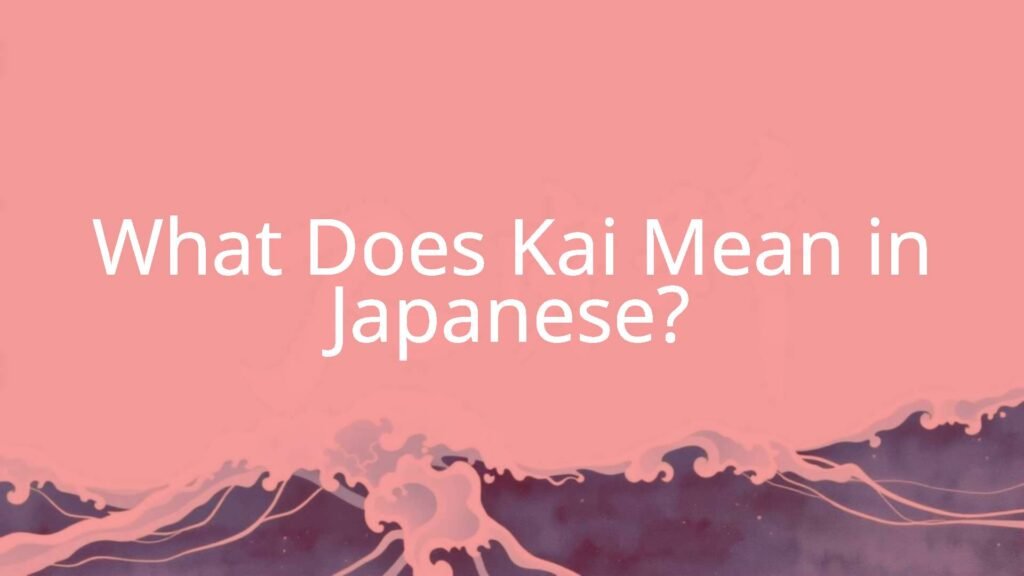The name “Kai” can have many different meanings in Japanese, and it depends on the kanji (Chinese characters used in Japanese) chosen to write it. While a name’s meaning in English usually stays the same, Japanese names like “Kai” can be written many ways, each with its own meaning. Common meanings include “sea” or “ocean” (海), “shell” (貝), “open” (開), “renew” or “change” (改), “victory” (凱), and “meeting” or “assembly” (会). This variety means that “Kai” can have a very personal meaning depending on the characters used.

How Is “Kai” Written in Japanese?
“Kai” can be written in three ways: hiragana, katakana, and especially kanji. In hiragana, it’s written as かい. In katakana, which is mostly used for words borrowed from other languages or for emphasis, it is written as カイ. But the biggest variety comes with kanji. Kanji can change the feeling and meaning of the name completely, even if the pronunciation stays the same. Parents can pick the kanji that match the meaning they want for their child’s name, making it a special naming tradition in Japan.

| Script | Writing | Usage |
|---|---|---|
| Hiragana | かい | Standard Japanese script |
| Katakana | カイ | Emphasis, foreign words |
| Kanji | Many options | Changes the meaning |
What Are the Most Common Kanji for Kai?
Some kanji used for “Kai” are more popular because of their positive meanings. The most well-known is 海, which means “sea” or “ocean.” This kanji suggests vastness and calmness. Another common kanji is 貝, meaning “shell” or “shellfish.” This can stand for beauty, protection, or something precious. Other choices include 開 (“open” or “begin”), 魁 (“leader” or “pioneer”), and 凱 (“victory” or “triumph”). There are over 100 ways to write “Kai” in kanji, showing just how flexible this name is in Japan.
| Kanji | Meaning |
|---|---|
| 海 | Sea/Ocean |
| 貝 | Shell/Shellfish |
| 開 | Open/Begin |
| 魁 | Leader/Pioneer |
| 凱 | Victory/Triumph |
| 会 | Meeting/Assembly |

Is Kai a Popular Japanese Name?
Yes, “Kai” is quite a common name in Japan. The amount of kanji options (104 reported) shows how often it is chosen. “Kai” is used for both boys and girls but is seen more for boys. Its easy pronunciation and positive meanings are some of the reasons why many parents select it. The connection to nature, strength, and good qualities helps the name stay popular over the years.
What Are the Different Meanings of Kai in Japanese?
What makes “Kai” stand out is that each kanji gives it a different meaning. This doesn’t just make it one name, but a group of names. Let’s look at some specific meanings:
Kai as “Ocean” or “Sea” (海)
The most famous meaning for “Kai” is “ocean” or “sea” (海). This can represent calmness, depth, and a love of nature. It’s a popular pick for both boys and girls and is easy to understand, both in and outside Japan.
Kai as “Shell” or “Shellfish” (貝)
Another common kanji is 貝, meaning “shell” or “shellfish.” This can stand for hidden beauty, strength, or something valuable. It’s a more subtle but still meaningful choice.
Other Kanji Meanings for Kai
- 開 (“Open”/”Begin”): Suggests welcoming, open-mindedness, or starting new things.
- 改 (“Renew”/”Change”): Means improvement, positive change, or the idea of moving forward.
- 凱 (“Victory”/”Triumph”): Implies success, strength, and the ability to overcome challenges.
- 戒 (“Command”/”Warn”): Conveys discipline, moral guidance, and self-control.
- 会 (“Meeting”/”Group”): Stands for coming together, teamwork, or unity.
- 界 (“World”/”Boundary”): Suggests a broad outlook or someone who understands different people and places.
What Are the Variations of Kai as a Name?
“Kai” comes in many forms. It can be a first name for boys and girls, or even a last name. This flexibility is one reason it’s liked by so many.
Boys’ and Girls’ Usage in Japan
“Kai” is for both boys and girls but is chosen more often for boys. Kanji with meanings like “ocean” or “leader” tend to be used for boys, while kanji meaning “beauty” (佳) or “flower” (華) might be picked for girls. The kanji chosen for “Kai” often tells you about the gender the parents had in mind.
Examples of Japanese Names Including Kai
- As a first name: Many well-known people are named “Kai,” including Kai Asakura (mixed martial artist), Kai Harada (rock climber), and Kai Kobayashi (racewalker). This shows the name’s popularity across different activities and generations.
- As a surname: “Kai” is also used as a last name, especially in the Kyūshū region. Some family names “Kai” come from an old province called Kai (now Yamanashi Prefecture). Examples include Akihito Kai (handball player) and Asami Kai (actress).

How Is Kai Used in Japanese Culture?
“Kai” is not just a personal name, but can be found in many aspects of Japanese life: in famous people, fictional characters, and even in place names and everyday language.
Famous People Named Kai
A number of well-known Japanese people have the name “Kai,” from sports to entertainment. Internationally, “Kai” is also popular, with people like Kai Alexander (British actor), Kai Havertz (German footballer), and Kai Cenat (American YouTuber). This wide use shows how the name is accepted worldwide.
Kai in Fiction and Pop Culture
“Kai” is common among characters in Japanese and foreign entertainment. For example:
- Kai in Ninjago: Masters of Spinjitzu (animated series)
- Kai Hiwatari in Beyblade (anime/manga)
- Kai Chen in Power Rangers Lost Galaxy
- Kai Parker in The Vampire Diaries
These characters often show leadership, energy, or determination, matching some of the name’s common meanings.
Kai in Japanese Geography and Words
| Word | Meaning | Kanji Used |
|---|---|---|
| Kaisha (会社) | Company | 会 (meeting), 社 (company) |
| Kaigi (会議) | Meeting/Conference | 会 (meeting), 議 (discussion) |
| Kaikei (会計) | Accounting | 会 (meeting), 計 (counting) |
Frequently Asked Questions About the Name Kai in Japan
Is Kai a Unisex Name in Japan?
Yes. While it is more common for boys, “Kai” is sometimes used for girls-mainly based on the kanji the parents select. Some kanji restate “male” qualities, while others are more feminine. This flexibility is unique to Japanese names.
Can the Meaning of Kai Change Depending on the Kanji?
Yes, the meaning of “Kai” changes with the kanji. For example, it can mean “ocean,” “shell,” “open,” “victory,” “leader,” “meeting,” and much more. This lets parents pick a meaning that is special for their child. Understanding the kanji is the key to knowing what “Kai” means for any individual in Japan.
- What Is a Maiko? - July 13, 2025
- What Does Domo Arigato Mean? - July 12, 2025
- What Does Naruto Mean? - July 12, 2025









